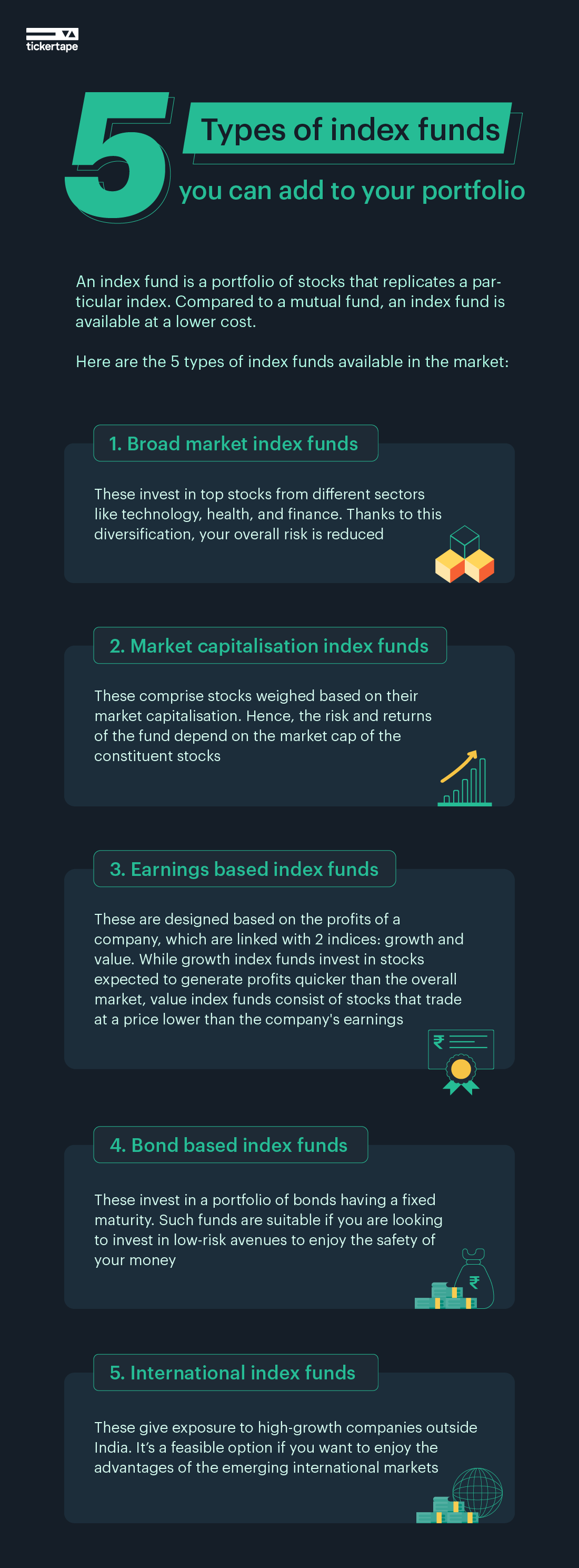Last Updated on Jun 29, 2021 by Aradhana Gotur
Investing in stocks has been one of the most popular investment choices to expand wealth. If you are new to investing or are a risk-averse investor, you are probably looking for low-cost investment options that offer stable returns. In such a case, index funds can be a favourable option for you.
The availability of a diversified portfolio of securities to choose from and the ability to invest in top-performing stocks make index funds quite popular among investors. The better the stock portfolio, the better will be the value and popularity of the index. But the question is, what are index funds?
This article covers:
Table of Contents
What is an index?
Before understanding what are index funds, let’s first look at what an index is. There are thousands of stocks listed on a particular stock exchange. You can’t track the performance of every stock and then choose the best one for your portfolio. This is where an index comes into play. An index is a portfolio of similar stocks forming part of a particular sector of the market.
An index or indices help you make an informed decision about your investment by grouping a particular section of similar stocks. These stocks are selected based on market capitalisation, size, earnings or the sector they belong to. For example, an index of the health sector will help you compare stocks of different health companies.
Alternatively, we can say an index measures any changes taking place in the prices of such stocks. If a particular stock return is higher than the index’s it means the stock is doing better than the index. However, if it’s lower, then that stock has underperformed.
In India, we have various types of indices like sectoral, broad-based and benchmark. BSE’s Sensex and NSE’s Nifty are the two benchmark indices in India. You can invest in these indices through index funds.
What are index funds?
Index funds are a type of mutual funds or exchange-traded funds that comprise the same portfolio of stocks in the same proportion as available in the index they are tracking. In other words, instead of buying individual stocks, you buy all of the stocks of companies comprising the index through index funds and that too at low cost.

What does the ‘same proportion’ mean?
In an index, each stock or security is assigned a certain weight implying that the index fund tracking that particular index will also hold the security in exact proportion. For example, if company “A” is allocated 5% in Sensex then the index fund tracking the Sensex will also hold 5% in company “A”.
Since index mutual funds mirror the underlying index at all times, be it the selection of stocks or their weightage, their returns also correlate with the return of the index. So for example, if the Nifty rises by 10% then the index fund following Nifty will also roughly see an increase of 10%.
These are like passive mutual funds, designed to simply follow the index they are tracking irrespective of how the market performs. The goal of index funds is to outperform each stock in the long run.
The index mutual funds are a good choice for beginner investors or even learned investors who want to invest for the long term. Let’s discuss different types of index mutual funds which you can choose from.
Types of index funds?
Contrary to popular belief, there are many index funds available in the market. You can analyse various index funds in India and then choose the one that perfectly fits your financial goal. The different types of index funds are:
Broad market index funds
As the name suggests, these index funds represent the stocks of the broad market. Whenever you want to invest in multiple sectors like technology, health or finance, you can choose the diversification process of broad market index funds. You get access to top stocks from different sectors at a low cost and if one sector underperforms then other sectors can balance their losses, hence reducing the overall risk.
Market capitalisation index funds
Some index mutual funds are based on the individual company’s market size, which is calculated by multiplying the company’s price per share with the number of shares outstanding. There can be largecap, midcap, and smallcap companies. This fund is suitable if you can hold your investments for a longer duration. By doing this, you give the smallcap and midcap stocks, and, in turn, your ETFs ample time to grow.
Earning based index funds
There are 2 types of index funds based on profit and earnings: growth index and value index. Growth indices indicate companies that are growing faster than the overall market, while value indices are representative of companies that are trading at a value lower than the company’s earnings.
Bond based index funds
These funds involve a portfolio with fixed maturity terms. These are suitable for those looking for safe and low-risk investments in the long run. The best way to get maximum return with bond funds is to allocate your investment proportionately in the long term, short term and, intermediate bond funds.
International index funds
If you want access to foreign high-growth companies, then this is the fund for you. Here you get the opportunity to invest in companies outside India. This fund is feasible if you want to avail the first-mover advantage in emerging international markets.
Warren Buffett, the world’s richest investor, said that index funds are one of the ideal investments to grow your capital. The index funds in India have not only been cost-efficient but have also outperformed most of the actively managed mutual funds in the last few years. But like every successful investment, you need to have a good prior strategy for your investment portfolio and a thorough research base. In short, you need to be disciplined.
- 10 Mind-blowing Facts About Harshad Mehta - May 30, 2025
- How DSP’s ETF Campaign Succeeded on Tickertape? - May 7, 2024
- Earnings Per Share Guide 2022 – Importance, Formula and Calculation - Aug 20, 2021





